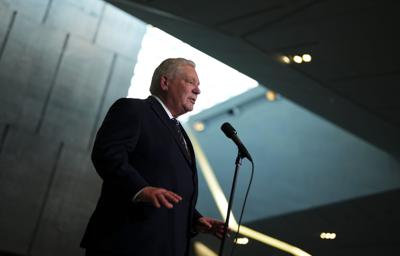Premier Doug Ford is extending “strong mayor” powers to another 169 smaller Ontario municipalities.
In the largest expansion yet of increased mayoral authority, Ford’s government announced Wednesday that scores of additional cities and towns would qualify as of May 1.
“Heads of council are key partners in our efforts to build homes and infrastructure across the province,” said Municipal Affairs and Housing Minister Rob Flack, who took over the department in last month’s cabinet shuffle.
“By extending strong mayor powers to these additional municipalities, we are providing mayors every tool at our disposal to empower them to get homes and infrastructure built faster,” said Flack.
“Mayors know their municipalities best and we support them in taking bold actions for their communities.”
Initially only granted to º£½ÇÉçÇø¹ÙÍøand Ottawa in 2022, strong mayor powers are currently available to 47 large or fast-growing municipalities.
They enable mayors to ram through legislation without majority support of their councils as well as control municipal budgets and hire and fire city department heads.
The Tories have argued the powers are necessary to “cut red tape” to expedite home construction in a province with a housing crisis.
While Ford has pledged to build 1.5 million new dwellings by 2031, his government is nowhere near meeting its goal.
Critics have warned that concentrating power in mayors’ offices may weaken local government by reducing the influence of elected councillors.
As well, in many smaller municipalities there is little to no local media oversight.
Among the communities that will soon be presided over by a strong mayor are: Bracebridge, Brighton, Brockville, Coburg, Collingwood, Cornwall, Goderich, Gravenhurst, Grimsby, Huntsville, King Township, Niagara-on-the-Lake, Orangeville, Orillia, Owen Sound, Prince Edward County, Shelburne, St. Thomas, Stratford and Timmins.
Association of Municipalities of Ontario president Robin Jones, whose organization represents the province’s 444 cities, towns and villages, hailed the changes.
“Increasing housing supply is a top priority for municipalities in every part of Ontario. Strong mayor powers can provide an additional tool to help municipalities play their important role in getting houses built,” said Jones, who is mayor of Westport.
“As the most trusted order of government, municipalities can be counted on to exercise new powers accountably and in the best interests of the public and the communities they serve,” she said.
Windsor Mayor Drew Dilkens noted he has “been able to support key initiatives in housing, transit and infrastructure, aligning with provincial priorities” since being given the powers two years ago.
“With the province’s support, we’ve streamlined processes, reduced barriers and launched initiatives like ‘housing solutions made for Windsor’ and the ‘strengthen the core downtown Windsor plan,’ driving further growth and development.”
Under a “weak-mayor” system, a chief magistrate can appoint committee chairs, but only has one vote on council.
Error! Sorry, there was an error processing your request.
There was a problem with the recaptcha. Please try again.
You may unsubscribe at any time. By signing up, you agree to our and . This site is protected by reCAPTCHA and the Google and apply.
Want more of the latest from us? Sign up for more at our newsletter page.
































To join the conversation set a first and last name in your user profile.
Sign in or register for free to join the Conversation